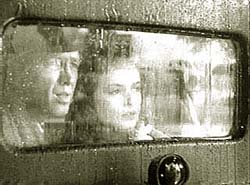Just this week I remembered a dream. That's rare for me. It seemed to tell me the importance of a decision - very - and my role in the world in which it takes place. It has already proved the seed of an idea for another screenplay. The power of dreams is so potent but so personal only someone as inventive as Michel Gondry should take us inside. But the story of real dreams - the what happens, who cares? - is the most elusive quality of dreams. Also, this movie.
In the middle of Gondry's rêve, I woke up more tired then when I settled down. At the one hour point, Stephane's dream - and his love-life ceased being interesting. This antic story should have taken flight by practical magic and in-camera effects such as Gondry is famous for. But by the middle no questions remained to be answered. Stephanie was already leaning toward Stephane, dramatically. With the slightest provocation she would fall into his arms. And the strength of Stephane's dream world presented too few problems and too little pressure on his growing love.
The calendar artist's boyishness prevented the story from developing stakes that we invested in, though there were at least two directions to chase them down. On one hand, his dream-life could crowd a real life that he finds he wants more and more desperately as he falls in love. On the other hand, his dream-life could become so attractive that he wins Stephanie's love by inviting her in and succeeds, against all obstacles, in making her at home there. Those of you who saw the end will tell me that this is how it ends, right? One performance note: If Gael Garcia-Bernal can't convince me that this world is charming and irresistible, who could?
Lemme see. What was I going to say? I think I need a nap.
skip to main |
skip to sidebar

Yes, we have RSS feeds!


A hard look at stories to learn about writing movies

Yes, we have RSS feeds!
Principles
It all started with, "I could write a movie that bad." Turns out, even that's hard. So...
- Appreciate what's admirable.
- Identify what's slack; examine why.
- Think fast and publish quickly because writing stories, not blogging, is the real deal.
Affirmations (or "Get off your ass!")
Luck is opportunity plus preparation plus luck. - Jane Espenson ~~ Don't let better be the enemy of good. - John August ~~ The business must eat stories. Don't wait. - Eric Jacobson ~~ The screenplay is a container for money. - John David Roberts ~~ Things are OK when the things you complain about are the things you used to dream about. - Aaron Sorkin
About Me

- John David Roberts
- I'm an experienced learning and OD professional, who's onto the what's new in learning, and in my few hours of spare time I write screenplays.
Seen and Read, 2007 (Screenwriter)
- Jimmy the Gent (Bertram Milhauser)
- To Be or Not to Be (Edwin Justus Mayer)
- The Cabinet of Dr. Caligari (1962, Robert Bloch)
- Notorious (Ben Hecht)
- The Treasure of Sierra Madre (John Huston)
- Down in the Valley (David Jacobson)
- Daddy Long Legs (Henry Ephron, Phoebe Ephron, Jean Webster)
- The Bells of St Mary's (Leo McCarey, Dudley Nichols)
- The Bishop's Wife (Leonardo Bercovici, Charles Brackett, Robert E Sherwood, Billy Wilder)
- Atonement (Christopher Hampton)
- Breach (Adam Mazer, Wm. Rotko, Billy Ray)
- Charlie Wilson's War (Aaron Sorkin)
- Enchanted (Bill Kelly)
- Disturbia (Christopher B Landon, Carl Elsworth)
- Because I Said So (Karen Leigh Hopkins, Jessie Nelson)
- Freaks (Clarence Aaron Robbins)
- Hollywoodland (Peter Bernbaum)
- My Super Ex-Girlfriend (Don Payne)
- The Bourne Ultimatum (Tony Gilroy, Scott Z. Burns, George Nofli)
- Sicko (Michael Moore)
- Knocked Up (Judd Apatow)
- The Island (Caspian Tredwell-Owen, Roberto Orci and Alex Kurtzman)
- The Princess Bride (William Goldman)
- The Wizard of Oz (Noel Langley, Florence Ryerson, Edgar Allen Woolf)
- Ocean's Thirteen (Brian Koppelman, David Levien)
- Broken Flowers (Jim Jarmusch)
- Live Free or Die Hard (Mark Bomback)
- Local Hero (Bill Forsyth)
- Hot Fuzz (Edgar Wright, Simon Pegg)
- Shrek the Third (Andrew Adamson, Howard Gould, Jeffrey Price, Peter S. Seaman, J. David Stern, David N. Weiss, Jon Zack)
- One Crazy Summer (Savage Steve Holland)
- Severance (James Moran, Christopher Smith)
- The Science of Sleep (Michel Gondry)
- Spider Man 3 (Sam and Ivan Raimi, Alvin Sargent)
- The Lives of Others (Florian Henckel von Donnersmarck)
- Jesus Camp (Heidi Ewing, Rachel Grady, dirs.)
- The Holiday (Nancy Meyers)
- Stranger than Fiction (Zach Helm)
- On Broadway (Dave McLaughlin)
- The Pursuit of Happyness (Steve Conrad)
- The Namesake (Sooni Taraporevala)
- The Last King of Scotland (Jeremy Brock, Peter Morgan)
- The Devil Wears Prada (Aline Brosh McKenna)
- The Knack...and How to Get It (Charles Wood)
- Borat (Sacha Baron Cohen, Anthony Hines, Peter Baynham, Dan Mazer)
- The Departed ( William Monahan)
- Zodiac (James Vanderbilt)
- Children of Men (Alfonson Cuaron, Timothy Sexton, David Arata, Mark Fergus, Hawk Otsby)
- The Chronicles of Narnia (Ann Peacock, Andrew Adamson, Christopher Markus, Stephen McFeely)
- The Incredibles (Brad Bird)
- The Goonies (Chris Columbus)
- Letters from Iwo Jima (Iris Yamashita)
- Flags of Our Fathers (Wm. Broyles Jr., Paul Haggis)
- Night at the Museum (Ben Garant, Thomas Lennon)
- Notes on a Scandal (Patrick Marber)
- Man on Fire (Brian Helgeland)
- Pan's Labyrinth (Guillermo del Toro)
- The Painted Veil (Ron Nyswaner)
- Babel (Guillermo Arriaga)
- Blood Diamond (Charles Leavitt)
- The Queen (Peter Morgan)
Screenwriting Bloggers
Labels
- blog news (2)
- comedy (2)
- 2008 awards (1)
- Apatow (1)
- Bateman (1)
- Bill Forsyth (1)
- Bill Kelly (1)
- Christmas (1)
- Dan in Real Life (1)
- Die Hard (1)
- Disturbia (1)
- Enchanted (1)
- Gondry (1)
- Heigl (1)
- Hot Fuzz (1)
- Mira Nair (1)
- Paul Fieg (1)
- Peter Hedges (1)
- Rear Window (1)
- Rogen (1)
- Tambor (1)
- airport (1)
- character (1)
- dream (1)
- genre update (1)
- goal (1)
- heroes (1)
- horror (1)
- ignorance (1)
- irony (1)
- parallel story (1)
- sincerity (1)
- slasher (1)
- sleep (1)
- story (1)
- thriller (1)
- town vs corp. (1)

No comments:
Post a Comment